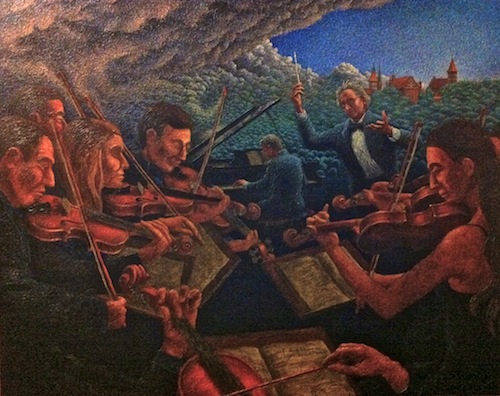Tony Johansen 2 | 14
16 Jan 2011 / #1
I am an artist I am working on a painting that is going to go to Olsztyn in Poland. My mother is half Polish but born elsewhere and cannot speak more than six words of Polish so cannot help me.
In English my painting is called "The 600 Year Old Song"
I use Google Translate to translate that as "Sześćset lat piosenki" or perhaps "Sześćset lat muzyka".
I know that both seem to be literally correct but I do not know if it is the way a Polish speaker would say it. Is it correct or should it be something else that captures what I mean in the title in English? The title refers to the 600 year history of Olsztyn and the way music continues to live there. The painting depicts Feliks Nowowiejski conducting an orchestra with Olzstyn castle in the background.
Also in English I would say "The 600 Year Old Song by Tony Johansen" What is the Polish way of saying that a painting is "by" a particular artist? Unfortunately Google Translate cannot help with cultural matters.
I want to get this correct. I think it is a matter of respect to get things right when doing something for another country. I think it is sad that my mother and her grandparents did not think it important to keep the Polish cultural memory alive in the family but I guess times were hard and survival in a new country was more important for them at the time.
In English my painting is called "The 600 Year Old Song"
I use Google Translate to translate that as "Sześćset lat piosenki" or perhaps "Sześćset lat muzyka".
I know that both seem to be literally correct but I do not know if it is the way a Polish speaker would say it. Is it correct or should it be something else that captures what I mean in the title in English? The title refers to the 600 year history of Olsztyn and the way music continues to live there. The painting depicts Feliks Nowowiejski conducting an orchestra with Olzstyn castle in the background.
Also in English I would say "The 600 Year Old Song by Tony Johansen" What is the Polish way of saying that a painting is "by" a particular artist? Unfortunately Google Translate cannot help with cultural matters.
I want to get this correct. I think it is a matter of respect to get things right when doing something for another country. I think it is sad that my mother and her grandparents did not think it important to keep the Polish cultural memory alive in the family but I guess times were hard and survival in a new country was more important for them at the time.
 PolishForums LIVE / Archives [3]
PolishForums LIVE / Archives [3]
